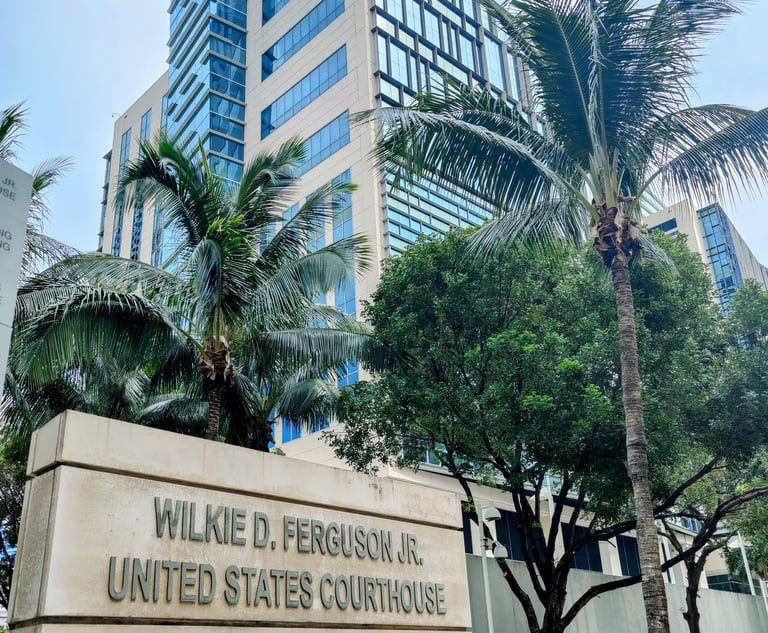 Marijuana farm. Photo: Shutterstock.com
Marijuana farm. Photo: Shutterstock.comOrchid Grower Loses Yearslong Medical Marijuana Fight
Louis Del Favero Orchids Inc. had asked the appeals court to nix eight licenses, arguing, among other things, that the settlement was unfair and contrary to public policy because it "contravenes the legislative intent" of a 2017 law aimed at implementing a constitutional amendment that broadly legalizes medical marijuana in Florida.
February 11, 2020 at 01:38 PM
4 minute read
A state appeals court tossed out a Tampa-based orchid grower's attempt to enter the state's medical-marijuana market, finding the nursery lacked standing to challenge eight licenses granted by Florida health officials last year.
Louis Del Favero Orchids Inc. challenged a settlement agreement between the Department of Health and firms known in the industry as "one-pointers."
But a three-judge panel of the First District Court of Appeal ruled Monday that Del Favero "was not a party to the joint settlement agreement and had not been denied a license based on any application filed."
The agreement resolved administrative complaints filed by the eight applicants and whittled the number of licenses expected to be available under a 2017 law aimed at implementing a constitutional amendment that broadly legalized medical marijuana in Florida.
"Since Del Favero was not a party to the administrative actions … it does not have standing to bring these appeals," Judges Scott Makar, Ross Bilbrey and Harvey Jay wrote in the eight-page order.
The orchid grower had asked the appeals court to nix the eight licenses, arguing, among other things, that the settlement was unfair and contrary to public policy because it "contravenes the legislative intent" of the 2017 law.
Those applicants lost out in a first round of licensing in 2015 after lawmakers legalized types of noneuphoric cannabis and did not meet requirements for licenses in the 2017 law.
The health department is "trying to give away licenses it doesn't have the authority to give away," Del Favero lawyer Seann Frazier told the appeals court during arguments in the case last month.
Under the 2017 law, health officials have to give special preference for up to two licenses to applicants that "own one or more facilities that are, or were, used for the canning, concentrating, or otherwise processing of citrus fruit or citrus molasses and will use or convert the facility or facilities for the processing of marijuana." Following passage of the law, Del Favero spent $770,000 to purchase property in Pinellas County that met the requirements for the citrus preference.
Del Favero had sought to intervene in some of the administrative complaints involving the other firms, but the orchid grower "could not have shown that its substantial interests would be sufficiently affected by the outcome of the administrative appeals" because Del Favero could not demonstrate "real and immediate" threat of injury at the time the petitions were filed, the court found.
Del Favero could not show "injury-in-fact" because, before and after the settlement agreement granted the eight new licenses, three potential licenses are still available, including the citrus-preference license Del Favero said it intended to pursue.
"The preference to be given to former citrus processors … was not eliminated by DOH's [the Department of Health's] final orders," Monday's ruling said. "It was undisputed that Del Favero never applied for a license under [the statute] and consequently, no such application by Del Favero had ever been denied."
Del Favero has waged a yearslong legal battle in pursuit of a license, with a pile of cases filed in state and federal courts as the nursery's owners have grown increasingly frustrated over health officials not allowing new applicants to gain access to the market.
Del Favero tried to register as a medical marijuana operator following an October 2018 court ruling, in an unrelated case, that found the 2017 law was "inconsistent" with the constitutional amendment. The state is appealing that ruling.
But health officials ignored Del Favero's attempts to get a license, while continuing to pare the number of available licenses and thereby giving the new operators a competitive advantage, the orchid grower's lawyers argued in court documents.
The 2017 state law required health officials to issue 10 new licenses to applicants that met certain requirements. The law also authorized additional licenses, as the number of Florida patients increased.
Overall, the state has issued licenses to 22 operators, including the eight new operators who were granted licenses last year. All of the currently licensed firms originally applied under the 2015 law.
Florida voters in 2016 approved the constitutional amendment to broadly legalize medical marijuana.
Dara Kam reports for the News Service of Florida.
This content has been archived. It is available through our partners, LexisNexis® and Bloomberg Law.
To view this content, please continue to their sites.
Not a Lexis Subscriber?
Subscribe Now
Not a Bloomberg Law Subscriber?
Subscribe Now
NOT FOR REPRINT
© 2024 ALM Global, LLC, All Rights Reserved. Request academic re-use from www.copyright.com. All other uses, submit a request to [email protected]. For more information visit Asset & Logo Licensing.
You Might Like
View All
'Close Our Borders?' Senate Judiciary Committee Examines Economics, Legal Predicate for Mass Deportation Proposal
3 minute read

'Stab Venequip in the Back': Caterpillar Faces $100M Lawsuit in Miami Federal Court
3 minute read
Another Roundup Trial Kicks Off in Missouri. Monsanto Faces 3 Plaintiffs
4 minute readTrending Stories
Who Got The Work
Michael G. Bongiorno, Andrew Scott Dulberg and Elizabeth E. Driscoll from Wilmer Cutler Pickering Hale and Dorr have stepped in to represent Symbotic Inc., an A.I.-enabled technology platform that focuses on increasing supply chain efficiency, and other defendants in a pending shareholder derivative lawsuit. The case, filed Oct. 2 in Massachusetts District Court by the Brown Law Firm on behalf of Stephen Austen, accuses certain officers and directors of misleading investors in regard to Symbotic's potential for margin growth by failing to disclose that the company was not equipped to timely deploy its systems or manage expenses through project delays. The case, assigned to U.S. District Judge Nathaniel M. Gorton, is 1:24-cv-12522, Austen v. Cohen et al.
Who Got The Work
Edmund Polubinski and Marie Killmond of Davis Polk & Wardwell have entered appearances for data platform software development company MongoDB and other defendants in a pending shareholder derivative lawsuit. The action, filed Oct. 7 in New York Southern District Court by the Brown Law Firm, accuses the company's directors and/or officers of falsely expressing confidence in the company’s restructuring of its sales incentive plan and downplaying the severity of decreases in its upfront commitments. The case is 1:24-cv-07594, Roy v. Ittycheria et al.
Who Got The Work
Amy O. Bruchs and Kurt F. Ellison of Michael Best & Friedrich have entered appearances for Epic Systems Corp. in a pending employment discrimination lawsuit. The suit was filed Sept. 7 in Wisconsin Western District Court by Levine Eisberner LLC and Siri & Glimstad on behalf of a project manager who claims that he was wrongfully terminated after applying for a religious exemption to the defendant's COVID-19 vaccine mandate. The case, assigned to U.S. Magistrate Judge Anita Marie Boor, is 3:24-cv-00630, Secker, Nathan v. Epic Systems Corporation.
Who Got The Work
David X. Sullivan, Thomas J. Finn and Gregory A. Hall from McCarter & English have entered appearances for Sunrun Installation Services in a pending civil rights lawsuit. The complaint was filed Sept. 4 in Connecticut District Court by attorney Robert M. Berke on behalf of former employee George Edward Steins, who was arrested and charged with employing an unregistered home improvement salesperson. The complaint alleges that had Sunrun informed the Connecticut Department of Consumer Protection that the plaintiff's employment had ended in 2017 and that he no longer held Sunrun's home improvement contractor license, he would not have been hit with charges, which were dismissed in May 2024. The case, assigned to U.S. District Judge Jeffrey A. Meyer, is 3:24-cv-01423, Steins v. Sunrun, Inc. et al.
Who Got The Work
Greenberg Traurig shareholder Joshua L. Raskin has entered an appearance for boohoo.com UK Ltd. in a pending patent infringement lawsuit. The suit, filed Sept. 3 in Texas Eastern District Court by Rozier Hardt McDonough on behalf of Alto Dynamics, asserts five patents related to an online shopping platform. The case, assigned to U.S. District Judge Rodney Gilstrap, is 2:24-cv-00719, Alto Dynamics, LLC v. boohoo.com UK Limited.
Featured Firms
Law Offices of Gary Martin Hays & Associates, P.C.
(470) 294-1674
Law Offices of Mark E. Salomone
(857) 444-6468
Smith & Hassler
(713) 739-1250






